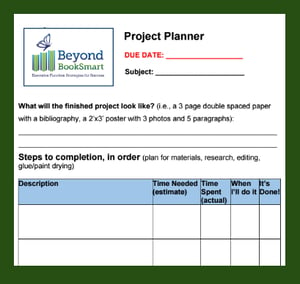Editor’s note: This week, we feature guest blogger Joanna Robin, Ph.D., of Bright Parenting. Please read more about Joanna below.
When kids struggle to do their homework, it can stir up so many emotions in parents. Maybe  you were the type of student who got your homework done right away and you didn’t have anxiety about homework—until now, when you see your own child struggling. Or maybe you’re putting pressure on yourself to help your child stay on track because as an adult, you understand what’s at stake. You have the perspective to know that doing well academically can mean more opportunities for your kid later.
you were the type of student who got your homework done right away and you didn’t have anxiety about homework—until now, when you see your own child struggling. Or maybe you’re putting pressure on yourself to help your child stay on track because as an adult, you understand what’s at stake. You have the perspective to know that doing well academically can mean more opportunities for your kid later.
And yet...you can’t force your child solve the math problem or complete the science lab. Even if you’ve created a dedicated work space and set aside time for the work to get done, if your kid doesn’t want to do his homework, he’ll often find a way. Of course, this leads to tension in families because it’s exhausting to have the same argument play out night after night. The promising news: Your desire to remain optimistic about your kid’s ability to do school work isn’t just good for your relationship with him. Research shows a link between parents staying positive about homework and better emotional functioning and less hopelessness in their children. In other words, your kid may be more likely to persevere with a task if you can stay upbeat.
In my private practice I work with many families and kids who struggle with homework conflicts. Although it can be challenging to stay positive, there are so many benefits for your child and the parent-child relationship.
5 strategies that will support you in your goal to stay positive about homework
1) Fill your tank. I’ve had parents say to me, “When I come home from work, my child is so upset over homework that I can’t even take my coat off before I sit down to help.” That’s actually not helpful. By that point you’re running on fumes, making it harder to control your mindset. Instead, take five minutes to drink water, change your clothes, grab some food. Say to your kid, “I’ll meet you in the homework spot after I get settled.” This comment sets the intention of a positive interaction, and you both will be better prepared for what’s ahead.
2) Stop living in an “I should” world. As a parent, you may think, “I should be able to make dinner and help my kid with her homework.” But if your child could do her homework while you make dinner, she would and that would be great. To have a more positive homework interaction, you need to meet your kid where she is. Remind yourself that other parents face different challenges with their kids, repeating to yourself, “This is my challenge and I’m going to put my energy into supporting my kid with her homework.”
3) Set small goals. One of the most effective ways that parents can encourage positive behavior is to break a task, like completing the evening’s homework, into several small steps and then give labeled praise for completion of each task. Labeled praise means to give specific praise about your kid’s positive behavior or actions.
Examples of how to set small homework goals:
“Let’s try one problem and see what that's like for you.”
“Let’s set a timer and work for five minutes and see what happens from that effort.”
Example of how to use labeled praise for homework goals:
“Wow, you were able to get the first question done with me only giving you a little help.”
“I’m really proud of the effort you put into those five minutes of work."
4) Be a smart cheerleader. When a child says, “I can’t do this homework. This is too hard for me,” you may rush to say, “No! You can do this! You can do it!” That sounds like the right thing, but a statement like that can make a child feel less confident because the child feels invalidated, like his feelings are wrong. Of course, the solution isn’t to agree with your kid that he can’t do it, either. Instead, acknowledge his feelings first and then add a pep talk: “I hear what you’re saying. You feel like this homework it so hard for you, and I know we can give it a try.” It’s important when you switch from validating to motivating that you use an “and” to link the two thoughts together and not a “but.” Using “but” cancels out what you said before, while using “and” makes both ideas true.
5) Exercise your positive muscle. Sometimes parents can sound more critical than they intend to. One example: When a kid is reading on the couch and the parent walks by and says, “Don’t you have real homework to do?” The better comment: “Wow, it makes me really happy to see you enjoying a book. And I’d love to make sure your homework is all set before dinner.” The more you exercise your positive muscle, by giving specific, labeled praise of “catching” your kid reading a book or walking the dog or unloading the dishwasher, the easier it will be for you to see and praise the positive when your kid tackles her homework.
As you put some or all of these strategies into place, be sure to pause and reflect on the hard work you’re doing. It can be all too easy to just move onto the next parenting concern once a strategy clicks. I remind parents that when they are kind to themselves and celebrate their own effort, they are modeling healthy self-care behavior for their kids, too!
Photo above by Mike Scheid on Unsplash
 Joanna Robin, Ph.D., is a licensed clinical psychologist at Westchester Anxiety Treatment Psychological Services, P.C. and a consultant with Bright Parenting, an all-new app for parents. Its daily reminders and easy lessons will help you stay positive and in control of how you parent each day.
Joanna Robin, Ph.D., is a licensed clinical psychologist at Westchester Anxiety Treatment Psychological Services, P.C. and a consultant with Bright Parenting, an all-new app for parents. Its daily reminders and easy lessons will help you stay positive and in control of how you parent each day.
 Help your child plan and complete a big project without the stress of last-minute household panic. Download our project planner template below:
Help your child plan and complete a big project without the stress of last-minute household panic. Download our project planner template below:

